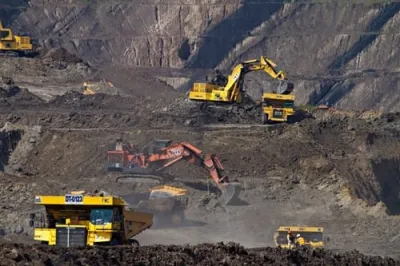How is the Centre Fast-Tracking Operations in New Mines?

Synopsis
Key Takeaways
- New intermediary timelines established for mining lease execution.
- Penalties for delays introduced to ensure accountability.
- Incentives for early operationalization of mining blocks.
- Existing auctioned blocks are also subject to new rules.
- State governments face penalties for delays in issuing Letters of Intent.
New Delhi, Oct 19 (NationPress) The Ministry of Mines has announced new regulations aimed at establishing intermediary timelines for various processes following the issuance of a Letter of Intent (LoI) until the execution of the mining lease. This initiative is designed to accelerate the operational readiness of mining blocks that have been auctioned to private companies.
The ministry has modified the Mineral (Auction) Rules, 2015, introducing these intermediary timelines effective from October 17, 2025, according to an official announcement made on Sunday.
Previously, the regulations allowed for a broad timeline of three years (with a potential extension of two years) for executing the mining lease following the LoI issuance. Missing this deadline led to the cancellation of the auctioned block. However, there was no system in place to track the progress of various stages from the LoI issuance to the lease execution, limiting opportunities for corrective actions.
The new amendment introduces mandatory intermediate timelines, with penalties for any delays. These penalties for not meeting interim deadlines are set at reasonable levels. Furthermore, if the final milestone is achieved within the designated timeframe, any penalties from earlier delays will be offset against the auction premium due. The primary goal is to facilitate the timely operationalization of the mine rather than impose strict penalties. Additionally, incentives for early operationalization have been established to deter potential bidders from stalling the process, as stated in the announcement.
For Mining Lease (ML) auctions, only 50% of the auction premium will be required for mineral quantities dispatched prior to five years from the LoI date. In the case of Composite Licence (CL) auctions, incentives for early production will apply to minerals dispatched before seven years from the LoI date.
Any delays beyond the specified timelines will lead to the appropriation of 1% of the bidder's bank guarantee for each month or part of a month delayed.
The complete timeline from LoI to ML execution, without incurring penalties, is three years for ML auctions, and seven years for composite licences.
In instances of delay or non-compliance, a committee led by the Director of Mines and Geology (DMG) from the state government—comprising members from the state Revenue and Forest & Environment Departments, as well as the IBM—will make determinations after providing a reasonable hearing opportunity to the preferred bidder. Penalties will only be enforced if delays are attributable to the bidder, as noted in the statement.
These intermediary timelines also apply to mineral blocks already auctioned. In such cases, preferred bidders must submit performance security within six months following the new amendment.
The remaining milestones that the preferred bidder must comply with will be applicable, with the timeline for the first remaining milestone commencing from the amendment's start date.
Should a state government fail to issue an LoI to the preferred bidder within 30 days (up from the previous 15 days) after the initial upfront payment and performance security submission, the second installment of the upfront payment due will be reduced by 5% for each month or portion thereof that the LoI is delayed, according to the announcement.
Since the inception of the auction regime in 2015, a total of 585 major mineral blocks have been successfully auctioned, including 34 critical mineral blocks auctioned by the central government. While the initial pace of auctions was slow, over the past three years, more than 100 mineral blocks have been successfully auctioned on average annually. In just the first seven months of the current year, 112 mineral blocks have already been auctioned successfully, the statement revealed.









